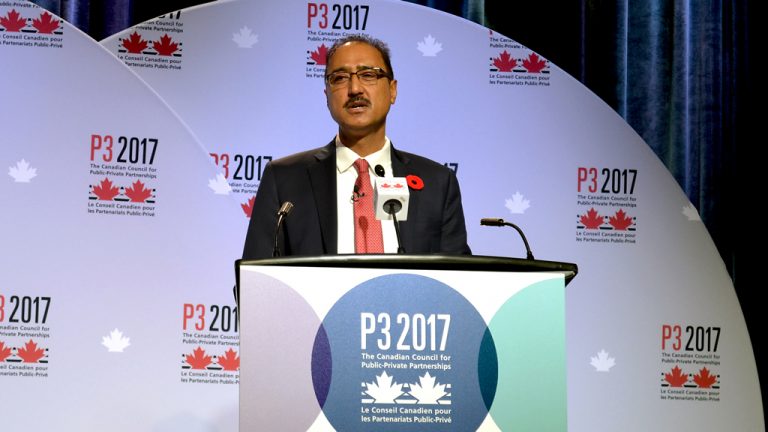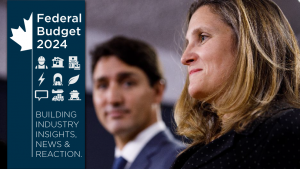Toronto Mayor John Tory has issued a plea to decision-makers at Canada’s major pension funds who have been investing billions in overseas projects to start looking in their own backyards for infrastructure investment opportunities.
Tory made the remarks on day two of the Canadian Council for Public-Private Partnerships (CCPPP) annual convention held in Toronto recently. He also urged private sector infrastructure stakeholders to come forward to him with ideas for a new wave of projects.
Tory and federal Infrastructure Minister Amarjeet Sohi were panellists at the CCPPP keynote session billed as the Urban Infrastructure Super Session held Nov. 7.
“The frustration for me, when I go to India and there’s an article in the Indian newspapers, when I was there six or eight months ago, extolling all the investments that have been made by our pension funds,” said Tory. “Similarly, when I was in China, our pension funds with big pools of wealth are known.
“We haven’t yet been successful, and I don’t assess the blame but I share it, in making sure we have presented things on a scale that would attract that same sort of investment and partnership to attract those same pools of wealth where they are resident and where the money comes from.”
Tory targeted affordable housing and transit as two sectors where the city needs an influx of ideas and enterprise to ensure Toronto can continue to attract investments such as Google’s recently announced waterfront project. Quayside from Google/Alphabet subsidiary Sidewalk Labs continues the momentum on the waterfront established by projects from Corus, George Brown College, Tridel and Menkes, Tory noted.
An essential element of the Port Lands plan is waterfront LRT, said Tory — the mixed-use communities in the area cannot wait 20 years for LRT to be in place, he said.
Sohi was asked after the panel session whether there would be federal funding for Toronto waterfront LRT.
“As far as the City of Toronto is concerned, we have given them a considerable amount of money in phase one to repair existing infrastructure and also to design large projects. Also, we have given them money for the waterfront including flood mitigation and we will work with them on the expansion of the public transit systems on the waterfront,” said Sohi.
Referring to Quayside, he added, “It is a very exciting project and it aligns with our priorities on sustainable communities and affordable housing choices for Canadians and we are looking forward to working with them.”

In his address to the CCPPP delegates Sohi listed infrastructure spending rolled out since the first federal budget in the spring of 2016, including phase one funding for 4,000 projects with $35 billion spent, extensive spending on transit including 900 old buses replaced, and hundreds of water and wastewater projects funded.
His department has recently been consulting with provinces and municipalities as the government moves into phase two, he said.
The priorities in phase two will be transit, green infrastructure, social infrastructure, trade and transportation projects and rural and northern communities.
Sohi also talked about the creation of the Canada Infrastructure Bank (CIB) as an “optional” tool for the government that will leverage private sector investment in revenue-generating projects to make public funds go further.
Later, asked about the protection of the public interest in the choice of CIB projects given the recent folding of the PPP Canada agency, he explained, “As far as the Canada Infrastructure Bank is concerned, we will only undertake projects that will serve the public interest. Once that determination is made we will leave it up to the expertise in the infrastructure bank and they will design these projects to make sure the public interest is protected.”
Sohi offered CCPPP delegates details of a new federal initiative announced in the 2017 budget, the Smart Cities Challenge. The program is intended to encourage cities to improve services and boost technical infrastructure. Examples he gave included integrating autonomous vehicles and encouraging innovations to reduce infant mortality.
There will be allocations of $50 million to one large city with the best proposal, two $10-million grants to medium-sized cities, $5 million to a small city and the same amount to an indigenous community.
Sohi explained the initiative was a partial component of a broader technology agenda.
“We will be investing close to $300 million in the Smart Cities Challenge,” he said. “The focus…is to mobilize resources, local expertise and technology and utilize data to improve efficiency and services within the system. We believe $300 million will act as a catalyst to unlock a large amount of private sector and institutional (expertise) to look at technology to improve services and to improve livability in communities.”











Recent Comments
comments for this post are closed